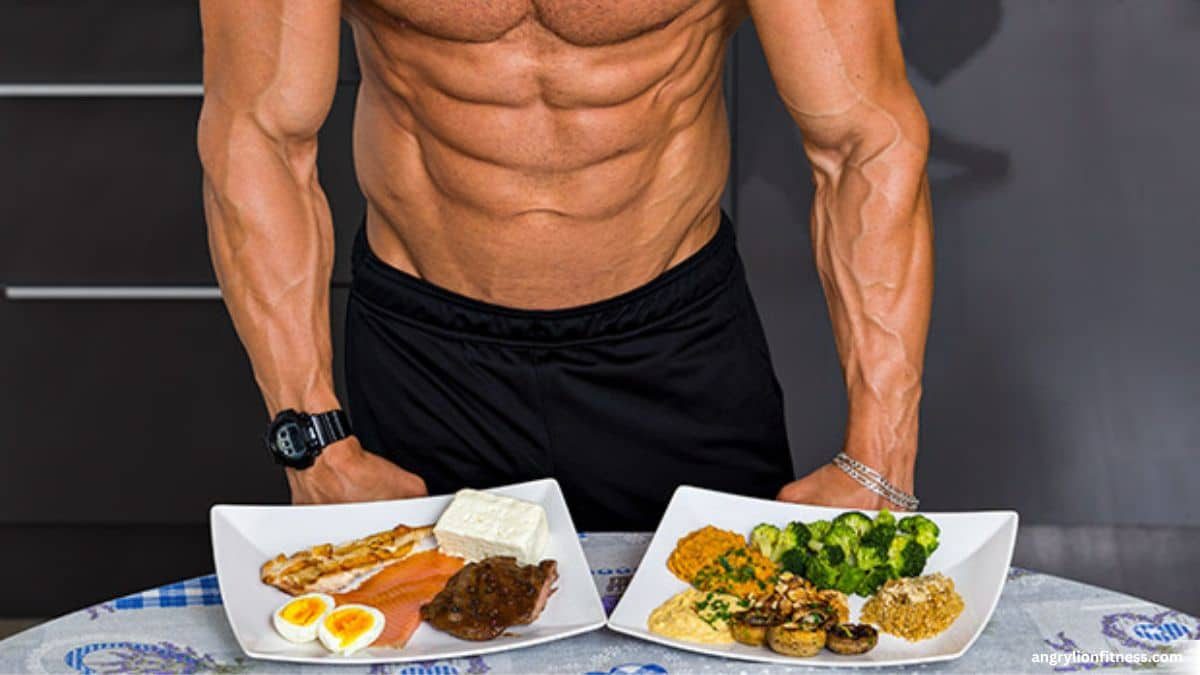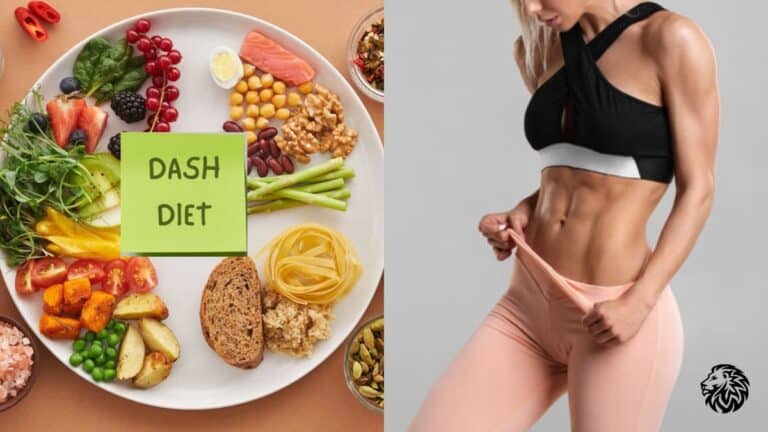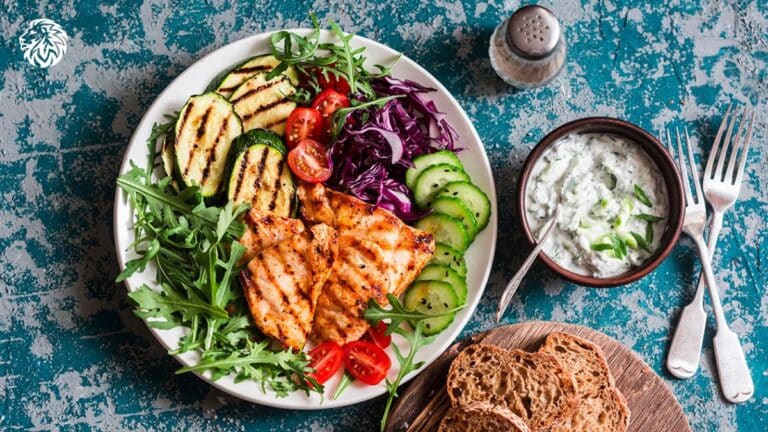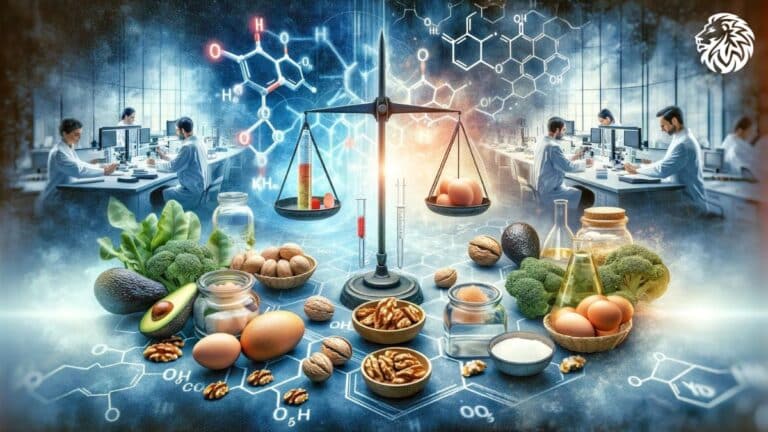Key Takeaways:
- Eating the right foods is crucial for building muscle, in addition to weight training and rest.
- Protein is an essential nutrient for building and repairing muscle tissue.
- Carbohydrates, healthy fats, and a range of important vitamins and minerals are also important for muscle growth and overall health.
- Incorporating a variety of muscle-building foods, such as lean beef, chicken breast, cottage cheese, Greek yogurt, eggs, salmon, quinoa, lentils, and almonds, can help optimize muscle-building potential.
Building muscle requires a combination of weight training, rest, and nutrition. While many people focus solely on the first two factors, nutrition is equally important. In fact, what you eat can have a significant impact on your muscle building progress.
This article will go over 25 foods that will help you gain muscle and will help you build more muscle. We’ll also go over the scientific rationale for why these foods work and how they can be good for your body.
1. Lean Beef
High-quality protein, which is necessary for repairing and maintaining muscle tissue, is abundant in lean beef. Significant amounts of other nutrients like iron, zinc, and vitamin B12 are also present.
One 3-ounce serving of lean beef provides:
- 22 grams of protein
- 2.6 grams of creatine
- 2.9 grams of leucine
2. Chicken Breast
Like lean beef, chicken breast is a great source of protein. It’s also low in fat, making it an ideal choice for those looking to build lean muscle mass.
One 3-ounce serving of chicken breast provides:
- 26 grams of protein
- 1.7 grams of creatine
- 2.4 grams of leucine
3. Cottage Cheese
Cottage cheese is a great source of casein protein, which is a slow-digesting protein that can help prevent muscle breakdown during periods of fasting (such as overnight).
One cup of cottage cheese provides:
- 28 grams of protein
- 3 grams of leucine
4. Greek Yogurt
Another fantastic source of protein, calcium, and probiotics is Greek yogurt. It is also a good option for those who are lactose intolerant because it has less lactose than regular yogurt.
One cup of Greek yogurt provides:
- 23 grams of protein
- 2.5 grams of leucine
5. Eggs
One of the foods with the most nutrients per serving is an egg. They are packed with important vitamins, minerals, high-quality protein, and good fats.
One large egg provides:
- 6 grams of protein
- 1.3 grams of leucine
6. Milk
Milk is a fantastic post-workout recovery drink because it is a great source of both whey and casein protein. Additionally, it has a lot of calcium and vitamin D, both of which are crucial for strong bones.
One cup of milk provides:
- 8 grams of protein
- 2.5 grams of leucine
7. Tuna
Tuna is a lean fish that’s packed with protein and omega-3 fatty acids, which are essential for muscle recovery and growth.
One 3-ounce serving of tuna provides:
- 22 grams of protein
- 1.3 grams of leucine
8. Quinoa
Quinoa is a grain that is free of gluten and contains a lot of vital vitamins and minerals as well as a lot of protein. It’s a good source of carbohydrates as well, which are necessary for providing energy during exercise.
One cup of cooked quinoa provides:
- 8 grams of protein
- 2 grams of leucine
9. Lentils
Along with fiber, a variety of vital vitamins and minerals, and plant-based protein, lentils are an excellent source of nutrition.
One cup of cooked lentils provides:
- 18 grams of protein
- 1.3 grams of leucine
10. Chickpeas
Chickpeas, also known as garbanzo beans, are another excellent source of plant-based protein. They’re also high in fiber and a range of important vitamins and minerals.
One cup of cooked chickpeas provides:
- 15 grams of protein
- 1.2 grams of leucine
11. Salmon
Salmon is a fatty fish that’s high in protein and omega-3 fatty acids. These nutrients are essential for muscle growth, recovery, and overall health.
One 3-ounce serving of salmon provides:
- 17 grams of protein
- 1.8 grams of leucine
12. Beef Liver
Beef liver is one of the most nutrient-dense foods on the planet. It’s high in protein, vitamin A, iron, and a range of other important nutrients.
One 3-ounce serving of beef liver provides:
- 20 grams of protein
- 3.5 grams of leucine
13. Almonds
Almonds are a great source of healthy fats, fiber, and protein. They’re also high in vitamin E, which can help protect against muscle damage caused by exercise.
One ounce of almonds (about 23 almonds) provides:
- 6 grams of protein
- 0.9 grams of leucine
14. Peanut Butter
Peanut butter is a delicious and convenient way to add protein and healthy fats to your diet. It’s also high in fiber and a range of important vitamins and minerals.
Two tablespoons of peanut butter provide:
- 8 grams of protein
- 0.7 grams of leucine
15. Oats
Oats are a great source of carbohydrates, fiber, and a range of important vitamins and minerals. They’re also a good source of protein, making them a great option for pre- or post-workout meals.
One cup of cooked oats provides:
- 6 grams of protein
- 0.9 grams of leucine
16. Brown Rice
Brown rice is a whole grain that’s high in fiber and a range of important vitamins and minerals. It’s also a good source of carbohydrates, making it a great option for energy during workouts.
One cup of cooked brown rice provides:
- 5 grams of protein
- 0.3 grams of leucine
17. Sweet Potato
Sweet potatoes are a great source of carbohydrates, fiber, and a range of important vitamins and minerals. They’re also high in beta-carotene, which can help improve exercise performance.
One medium sweet potato provides:
- 4 grams of protein
- 0.1 grams of leucine
18. Broccoli
Broccoli is a great source of fiber and a range of important vitamins and minerals. It’s also high in sulforaphane, a compound that can help reduce inflammation and improve muscle recovery.
One cup of cooked broccoli provides:
- 2.6 grams of protein
- 0.2 grams of leucine
19. Spinach
Spinach is a nutrient-dense leafy green that’s high in iron, calcium, and a range of important vitamins and minerals. It’s also a good source of protein and antioxidants, which can help improve muscle recovery.
One cup of cooked spinach provides:
- 5 grams of protein
- 0.4 grams of leucine
20. Brussels Sprouts
Brussels sprouts are a great source of fiber and a range of important vitamins and minerals. They’re also high in vitamin C, which can help protect against muscle damage caused by exercise.
One cup of cooked Brussels sprouts provides:
- 3 grams of protein
- 0.3 grams of leucine
21. Asparagus
Asparagus is a nutrient-dense vegetable that’s high in fiber, folate, and a range of important vitamins and minerals. It’s also a good source of antioxidants, which can help reduce inflammation and improve muscle recovery.
One cup of cooked asparagus provides:
- 3 grams of protein
- 0.3 grams of leucine
22. Avocado
Avocados are a tasty and nutrient-rich fruit that are rich in fiber, healthy fats, and a variety of vital vitamins and minerals. Additionally, it contains plenty of potassium, which can facilitate better muscle contractions during exercise.
One medium avocado provides:
- 4 grams of protein
- 0.4 grams of leucine
23. Beets
Beets are a great source of carbohydrates, fiber, and a range of important vitamins and minerals. They’re also high in nitrates, which can help improve blood flow and oxygen delivery to muscles during exercise.
One cup of cooked beets provides:
- 2 grams of protein
- 0.1 grams of leucine
24. Blueberries
A tasty fruit full of vitamins, minerals, fiber, antioxidants, and other necessary nutrients, blueberries are also very nutritious. Because they are a good source of carbohydrates, they make a fantastic pre- or post-workout meal.
One cup of blueberries provides:
- 1 gram of protein
- 0.1 grams of leucine
25. Watermelon
Watermelon is a refreshing and hydrating fruit that’s high in water content and a range of important vitamins and minerals. It’s also a good source of carbohydrates, making it a great option for pre- or post-workout meals.
One cup of diced watermelon provides:
- 1 gram of protein
- 0.1 grams of leucine
Conclusion
You can increase your muscle mass, boost your general health, and improve your athletic performance by including these 25 foods in your diet. Keep in mind that developing muscle requires more than just weightlifting; it also requires a comprehensive approach to your diet and exercise.
You can maximize your muscle-building potential and reach your fitness goals more quickly than ever before by providing your body with the right nutrients.
FAQs
Can I build muscle without eating meat?
Yes, you can still build muscle on a vegetarian or vegan diet by incorporating plant-based sources of protein, such as lentils, chickpeas, and quinoa.
Do I need to eat a lot of protein to build muscle?
While protein is essential for building and repairing muscle tissue, you don’t need to eat an excessive amount of it. Aim for a protein intake of around 0.8 grams per pound of body weight per day.
Should I eat carbohydrates when trying to build muscle?
Yes, carbohydrates are important for providing energy during workouts and for replenishing glycogen stores after exercise. Aim for a balanced diet that includes both carbohydrates and protein.
Can I build muscle without lifting weights?
While weightlifting is one of the most effective ways to build muscle, you can still achieve muscle growth through bodyweight exercises and other forms of resistance training.
Can I eat junk food and still build muscle?
While it’s possible to build muscle while eating junk food, it’s not recommended. Junk food is typically high in calories, unhealthy fats, and added sugars, which can have negative effects on your overall health and athletic performance. Aim for a balanced diet that includes nutrient-dense foods to optimize your muscle-building potential.







